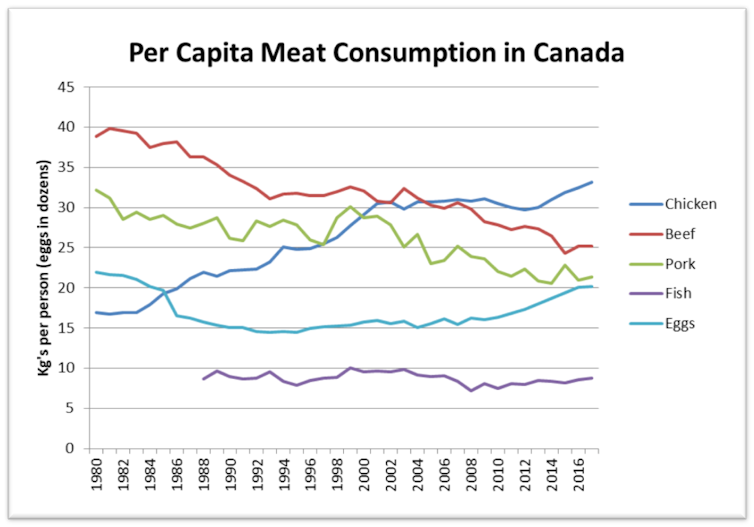Why Is Beef Production Going Down

Meat consumption is irresolute but information technology's not because of vegans
Meat consumption in North America is irresolute. Product developers and policy-makers need to understand the reasons for that change. Information technology'south tempting to attribute the decrease in meat consumption to a rise in vegetarianism and veganism, but not all vegans are the same, and overall they play a relatively small role in consumption changes.
How is meat consumption irresolute?
In Canada, per capita meat consumption is going down. The mix of meat eaten is also changing.

For example, the consumption of both chicken and eggs is actually rising. Incidentally, eggs were once vilified in the early 1980s due to health concerns about dietary cholesterol. With changing wellness recommendations, demand for eggs has increased again in Canada.
This increase in eggs and chicken is worth noting because it suggests that something other than animal welfare — a primary driver of veganism — may be driving the modify in meat consumption. If environmental or health concerns are driving the change, and so the alter in relative amounts of different meats makes more sense.
How many vegans are at that place?
Studies in Canada suggest that approximately five to seven per cent of Canadians identify as vegetarian, and another three to four per cent as vegan. A recent survey at the University of Guelph was consistent with this estimate.
Such small numbers can't be driving the type of changes we're seeing in meat consumption. It is besides worth noting that the proportion of vegans and vegetarians in the United States is very similar to that in Canada. U.S. meat consumption is actually growing — although the red meat/chicken proportions are following a like path to those in Canada.
If vegans and vegetarians are driving the change in meat consumption, nosotros would wait American meat consumption to exist decreasing the way information technology is in Canada. Information technology's non.
Many surveys also overstate the number of true vegans and vegetarians in Canada. Our contempo survey suggests that many of those identifying as vegans or vegetarians are actually eating meat. We found that one third of those who identified as vegetarians and more than than half of those who identified as vegans ate meat relatively regularly.

This miracle is called virtue signalling and is piece of cake to empathise; people want to eat less meat. In that location is increasing social pressure to reduce meat consumption, resulting in more institute-based diets and fifty-fifty a recommendation in the new Canada Food Guide encouraging meatless meals.
And so as nosotros run across new surveys suggesting growth in the number of Canadians adhering to a vegan or vegetarian diet, nosotros need to consider if possibly virtue signalling is complicating the interpretation of these results. There may be real growth, but it is probably less than the surveys advise. And so, again, it's unlikely vegetarians and vegans are driving the changes in meat consumption.
The aforementioned contempo University of Guelph food consumer survey suggested that virtually 85 per cent of Canadians are eating at least one principal meal per month without animal protein. In short: Canadians eat meat, but they're beginning to eat less of it.

While at that place may exist some virtue signalling hither too, information technology is relatively clear that "meat minimizers" or flexitarians — those who yet eat meat, simply are eating less of it — are driving changes in meat consumption.
Baca juga: How restaurants are wooing 'flexitarians'
Why does information technology affair?
Part of the decrease in meat consumption is due less to selection than to demographics. The Canadian population is aging, and every bit nosotros historic period, we eat less overall and and so protein portions become smaller.
It is virtually likely that the motivators for flexitarians to subtract meat consumption are related to wellness and the environment. People feel like they're making a positive difference by reducing their red meat consumption without having to give up the guilty pleasure of meat entirely. A 2015 U.S. study institute that 80 per cent of vegans suggested that they were motivated by animal welfare/ethics and only twenty per cent by factors relating to wellness. So welfare concerns are more likely to lead to an absolute abandonment of meat, while health or environment could lead simply to a reduction in meat consumption.
This has implications for new production development. A vegan who has given up meat for ethical reasons is unlikely to desire to replicate the meat feel. However in that location is significant focus right now on constitute-based burgers and other products that mimic the oral fissure experience, season and overall feel of beef — not for vegans, plain, simply for meat-eaters choosing to reduce their consumption.
Mimicking meat
In a recent podcast, Pat Brown, the CEO of Impossible Foods and a long-time vegan, highlights the environmental motivation for developing a burger analog.

He besides highlights the importance of making it taste and feel similar a real burger to make it more palatable for meat-lovers. Information technology's likewise worth noting that A&W is launching a new breakfast sandwich with a Beyond Meat vegan sausage that also contains an egg. This is clearly not a product targeted at vegans, simply one focused on flexitarians.
Cultured or lab-grown meat is besides lauded for its environmental and wellness benefits. The argument is that there are fewer emissions from cattle when the burger is grown in an industrial vat (although there are those who fence that this may non be true).
At that place's also a suggestion that we tin engineer lab-grown meat to have a healthier poly peptide and fat contour.
Another indication of the motivation for meat minimization is the boxing for words like meat and milk. From almond milk to vegan cheese to Impossible Burgers, products are being defined every bit animal analogs rather than replacing beast protein.
These products are suggesting it's the same matter with different ingredients. Traditional suppliers, meantime, argue that these new products aren't "meat" or "milk" but different sources of protein. This matters in the mind of consumers. Some jurisdictions accept even begun regulating what can be called meat.
There are clearly changes happening in meat consumption. But information technology's not being fuelled by an increase in veganism and vegetarianism.
Pembaca kami
Jumlah pembaca The Chat sebanyak 18 juta pengguna setiap bulan, dan melalui Creative Commons republikasi menjangkau 42 juta pembaca.
Mau menulis?
Tulis artikel dan bergabung dengan komunitas akademisi dan peneliti yang terus tumbuh dengan lebih dari 146.900 dari 4.380 lembaga.
Daftar sekarang
Source: https://theconversation.com/meat-consumption-is-changing-but-its-not-because-of-vegans-112332

0 Response to "Why Is Beef Production Going Down"
Post a Comment